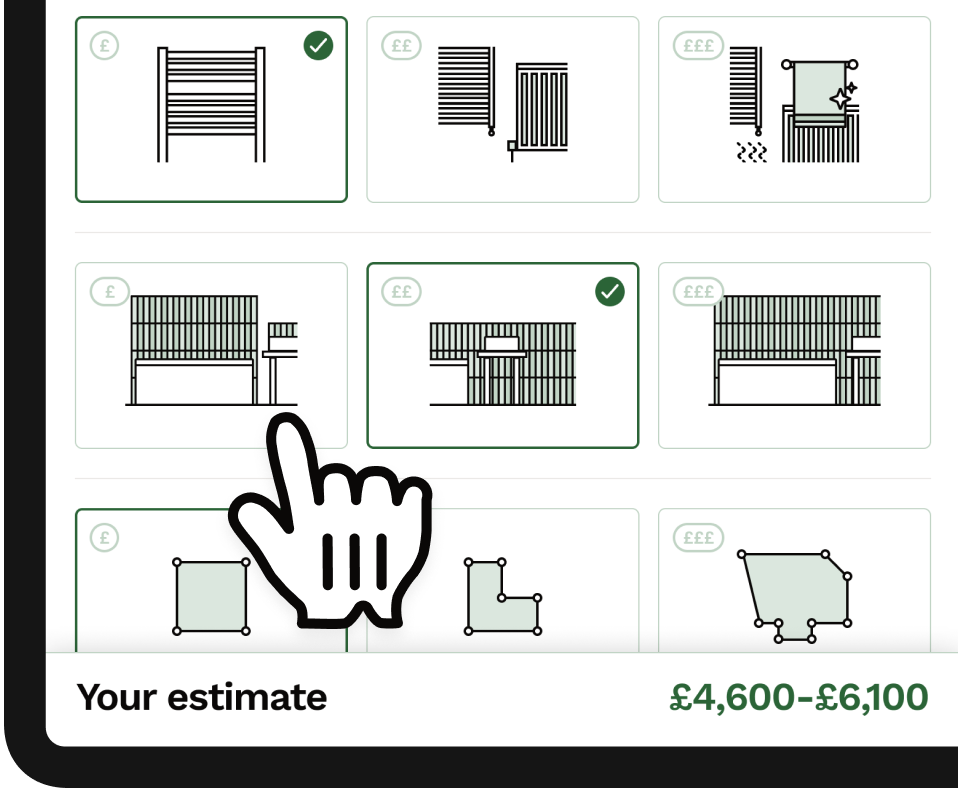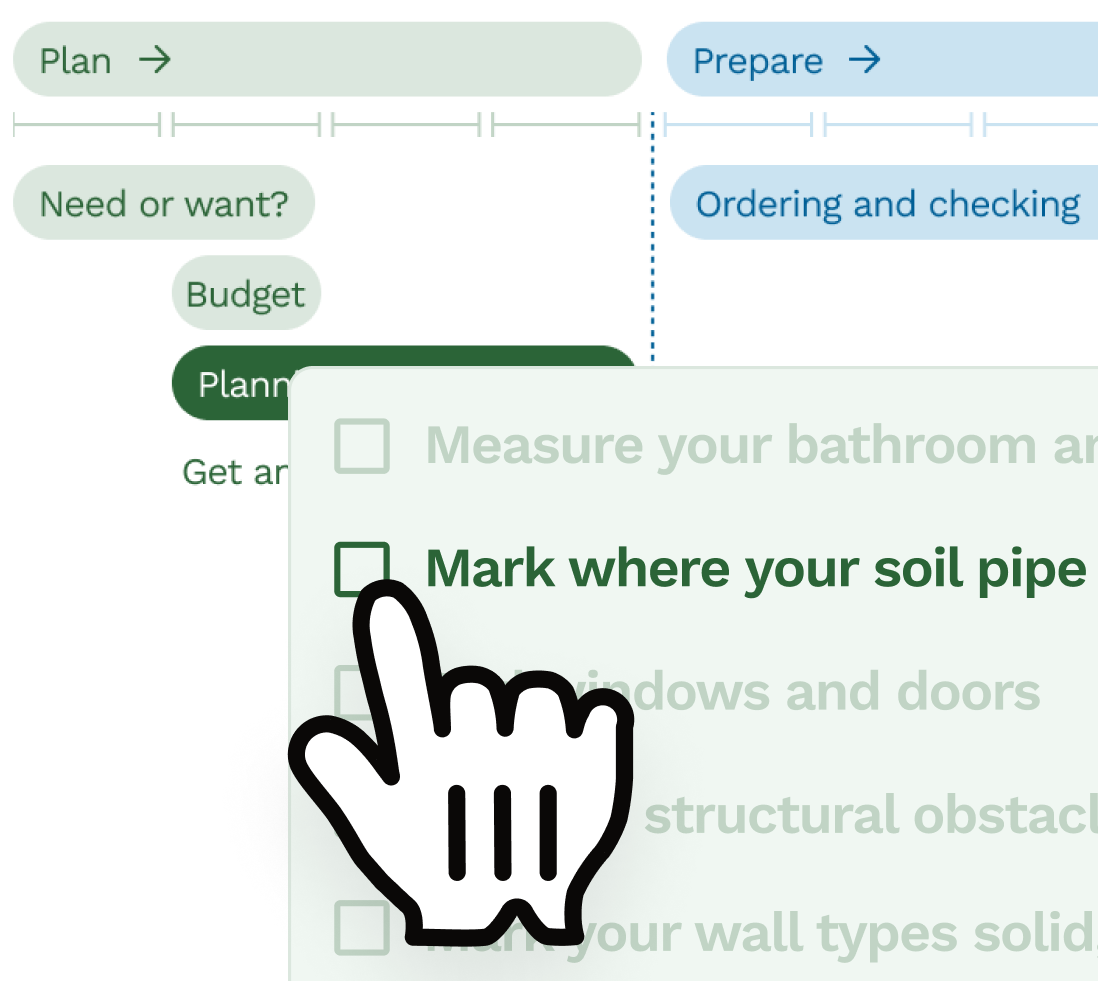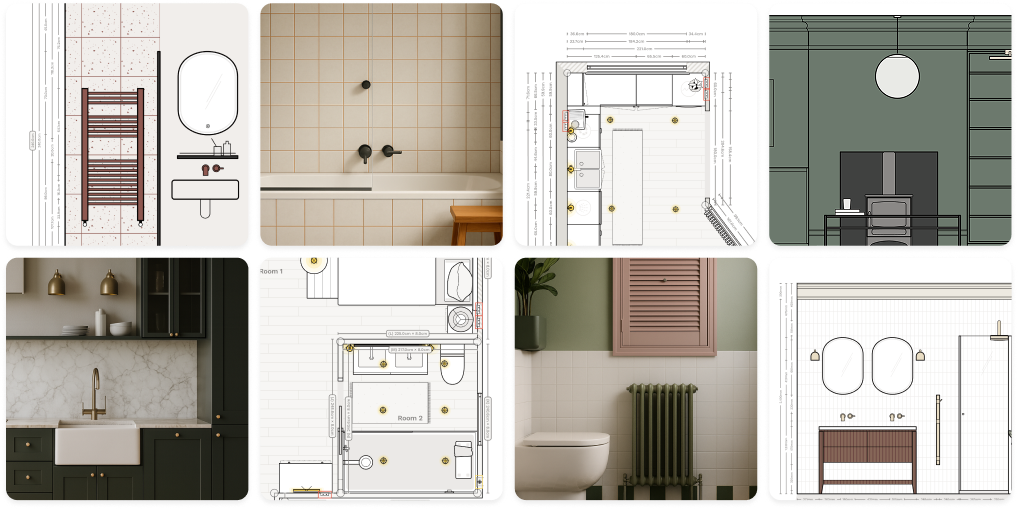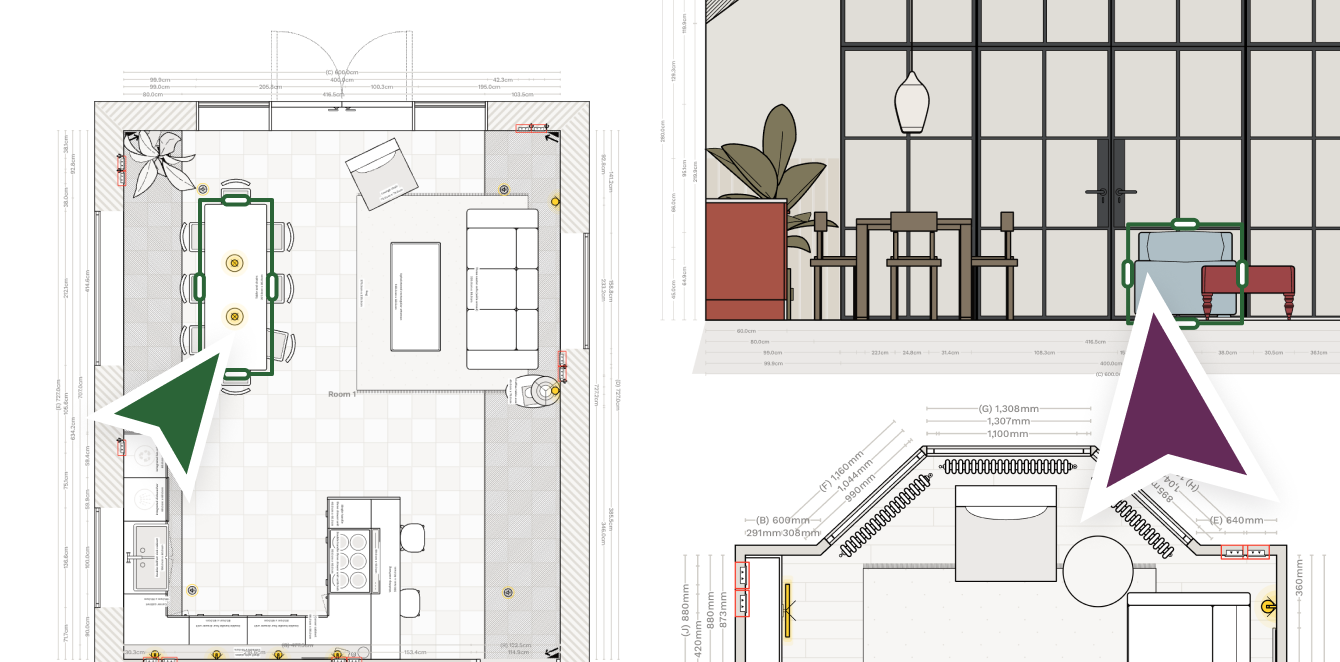Help & advice
How to work well with your trades
Based on many years of experience working with trades and learning lots of painful lessons along the way, this is our step–by–step guide to how to set your bathroom renovation project up for success and collaborate effectively with your trades to get the best (and most enjoyable) result.
These same steps apply whether you're working with a general builder / contractor to manage the whole project, or you plan to source and project manage individual trades like bathroom fitters, plumbers, electricians, plasters and decorators etc.
Before the work begins:
Get a written contract
It is essential to have a signed, written contract in place before you go ahead with any building work. A contract protects both parties and provides clarity and peace of mind by:
- Ensuring both parties know what to expect so that misunderstandings can be avoided
- Providing clear agreement on what will and won’t be covered
- Setting out payment gateways
If you are working with an architect they will often administer a contract for you. If you're working directly with a general builder / contractor or individual trades, it would typically be the builder or trades that provides a contract.
If your chosen trades don't provide you with a contract, ask for one. If they don't already have a standard contract template they use, they can easily find one online. For example, The Federation of Master Builders provide contract templates for their members to use.
Make sure the contract includes all the agreements you have made with your trades, the project brief, schedule of the works, payment schedule, start and finish dates and any ground rules you have set around access to your property and use of your facilities etc.
Talk about money
Talking about money can be uncomfortable, but renovation projects typically represent a significant investment of your hard earned money and so it's important to start having open conversations with your trades about the financials early on, and definitely before any work begins!

Never pay large sums up front
Depending on where you are and who you are working with, some trades may request an up front deposit to secure the work or if there are a lot of materials to purchase in advance – cash flow is often key for small businesses.
If you're comfortable doing so it's fine to pay a deposit, but be sure to keep it to no more than 20–30% of the overall cost, the smaller the amount the better. Paying large sums up front puts you at risk of a trade taking your money and not turning up on time, or at all!
If you're asked to pay a deposit but aren't comfortable to do so, you could instead bring the first payment forward, for example after the first week of work is complete.
Agree a staged payment plan
Instead of up front payments, agree a staged payment plan with your trades that supports their cash flow needs by ensuring small regular incremental payments, whilst giving you some way to map payments to progress through the agreed work.
Here is a rough guide of the different staged payment models you could use based on the scale of your project:
SMALL PROJECTS ~2-4 WEEKS
A simple two part payment schedule would typically be suitable for a small project, one mid way through and the other on completion. Other models are likely to represent too much unnecessary admin overhead on you and your trades.
MEDIUM PROJECTS ~4-12 WEEKS
For longer projects you'll want to structure it with regular payments agreed up front. The simplest way to do this is to agree to a fixed amount to be paid at regular intervals, i.e. every fortnight / month.
If you're keen to keep the payments tracking along with progress of the project, instead of a fixed frequency of payments you can agree a number of payments each tied to a key project milestones e.g. first fixes complete, sanitaryware installed and functioning, tiling complete etc.
LARGE PROJECTS >3 MONTHS
For much larger projects you'd typically use a detailed percentage completion model against a very detailed schedule of works, typically administered by an architect.
Set ground rules
Agreeing a set of ground rules and aligning expectations between parties is key to getting your project up and running from day 1. The sorts of things you'll want to discuss and agree, are:
- Who will be your primary contact and point of escalation
- Who will be on site day to day
- What communication methods will you use (whatsapp, daily calls, on site meetings etc.)
- Start and finish dates
- Any dates that the trades can’t be on site
- Working hours i.e. start and finish times
- Access to your home, parking and materials deliveries etc.
- Use of facilities in your home i.e. toilet, hot water, making drinks and food etc.
- Storage of tools and materials
- Level of clean up at the end of each working day or at the end of the working week
Getting all these things discussed and agreed on up front saves a lot of discomfort and risk of conflict and disappointment during the project.

During your project:
The key thing to get right during the project is the two way communication between you and your trades. This includes:
- Having regular meetings
- Day to day communication
- Dealing with issues quickly
- Discussing and agreeing any changes in detail
Make sure you meet with your trades regularly, in person, on site. Weekly is normally about right. This ensures everyone has a good understanding of progress and can plan ahead and make decisions collaboratively.
When it comes to day to day coordination and questions it is helpful to agree with everyone involved how you'll communicate and set some expectations. Whatsapp is great to allow free flowing conversation and sharing pictures etc. Use a group chat when there is a team of trades involved so everyone stays informed and the right person can answer questions directly removing delays from relaying messages.
Deal with issues quickly! It might seem obvious, but don't wait for the weekly in person meetings to raise issues, expose issues as soon as they come up and discuss and agree together how to tackle them.
When it comes to making changes, it will happen. Unforeseen things will force changes to plan, and you will no doubt change your mind about something as the project evolves, and that's OK!
Make sure changes get talked about in detail, including ensuring everyone understands the impacts / knock-on effects to other aspects of the project / plans before it happens. And don't shy away from talking about the financial implications. Get a clear idea of the cost of every change to avoid an unexpectedly high final bill at the end of the project when it's too late to do anything about it.
Frequently asked questions
Why do I need a written contract with my trades?
A written contract protects both you and your trades by laying out exactly what's included, expected timelines, and payment plans. It's essential for preventing misunderstandings and keeping everyone on the same page. If your trade doesn't offer one, don't be afraid to ask - they can easily find a template if needed.
Should I pay a deposit before work starts?
Some trades might ask for a small deposit, especially if they need to buy materials upfront. If you&aposl;re comfortable with it, a deposit of around 20-30% of the total cost is reasonable - but avoid large up-front payments. If you're unsure, propose paying the first installment after a week of work to protect yourself.
What's a staged payment plan, and why should I set one up?
A staged payment plan breaks down your payments across the project's milestones or set intervals. It supports the trade's cash flow while linking payments to progress, so you're only paying as work is completed. For a small job, you might make two payments; for larger projects, you can plan regular installments or tie payments to key milestones.
What kind of ground rules should I set with my trades?
Setting ground rules upfront helps avoid issues down the line. Discuss who'll be your main contact, daily start and end times, site access, and cleanup expectations. This also includes how they'll use your facilities and any parking arrangements. A few simple agreements can prevent future headaches.
How often should I meet with my trades during the project?
Weekly in-person meetings on-site are generally ideal. These keep everyone updated on progress and help you tackle any changes or questions in real time. For day-to-day questions, WhatsApp group chats work great to keep communication flowing smoothly between everyone involved.
What should I do if issues come up during the project?
Don't wait. Quick communication prevents small problems from becoming bigger headaches and allows you and your trades to find solutions right away.
How do I handle unexpected changes during the project?
Changes are normal! Discuss each change in detail, covering any impact on the timeline, cost, or other aspects of the work. Don't hesitate to ask about costs upfront so you can make informed decisions and avoid surprises at the end.
Renovating? Read more...
All rooms
How do I find good trades for my project?
Get local recommendations, use the internet to verify, prepare a brief, get three quotes and talk to previous customers!
All rooms
Save money, save energy and save water from your renovation.
You've got the vision for your dream room - colours, tiles, that perfect finish. But have you thought about how it's going to perform?
Free tools to get started




Start your renovation with Reno